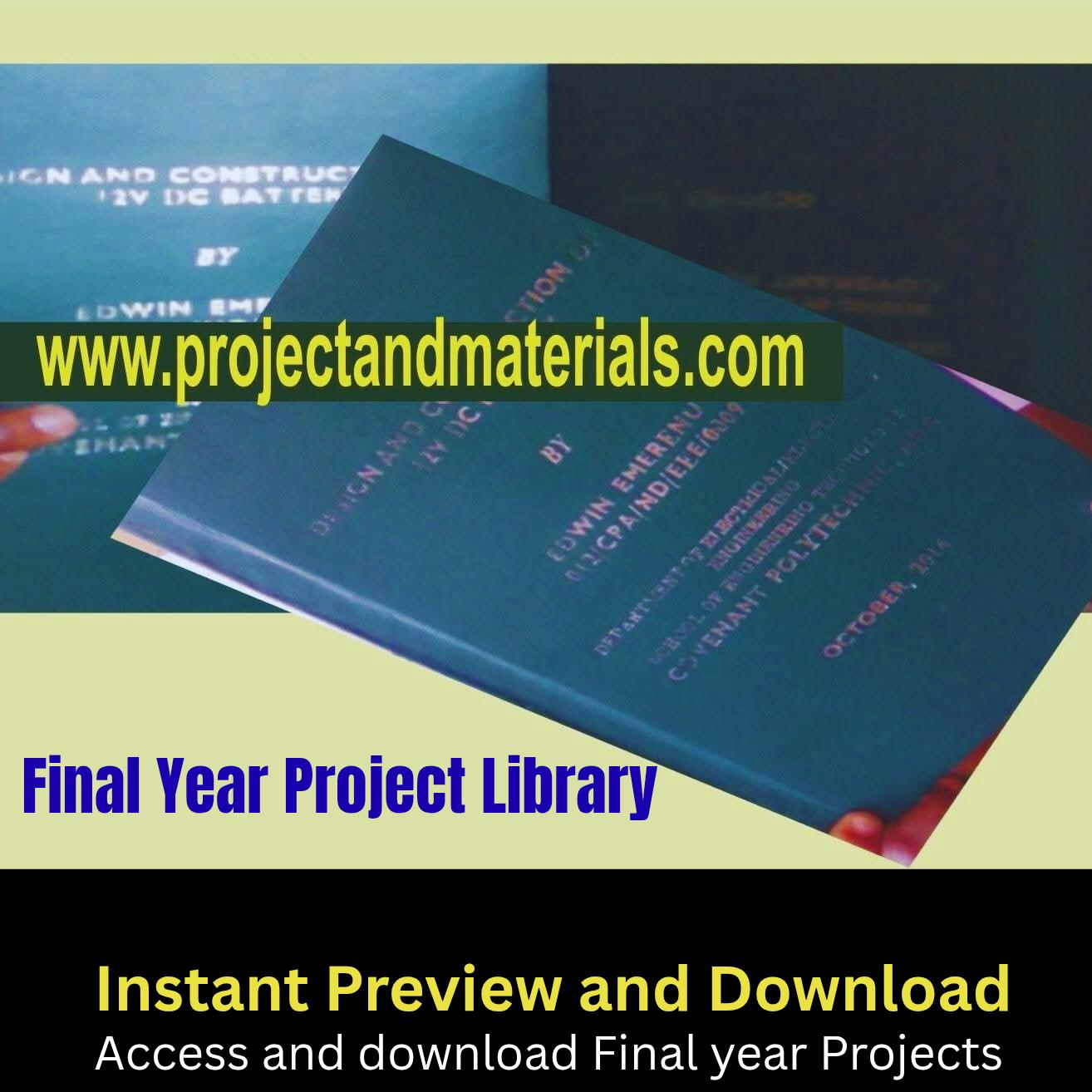UTILIZATION OF AQUEOUS TWO PHASE SYSTEM FOR THE REMOVAL OF COLOUR FROM TEXTILE WASTEWATER
📄 Project Abstract
Colour removal from effluent textile wastewater will greatly improve the quality of water bodies, which is vital to environmental health and sustainability. This study is based on finding more efficient methods of treating the effluent of textile wastewater by removing colour as a contaminant. The effects of concentration of dye solution, tie line length and weight ratio on the effectiveness of aqueous two phase system were studied. Five different textile dye colours were simulated at concentrations of 500 mg/l and 250 mg/l, and the efficiency of decolourization using polyethylene glycol/ammonium sulphate (PEG/(NH4)2SO4) and polyethylene glycol/sodium carbonate (PEG/Na2CO3), aqueous two phase systems (ATPS) as a separation technique was tested. The study showed that the best tie line length (TLL) of 52.51 % (w/w) and 55.50 % (w/w) for PEG/(NH4)2SO4 and PEG/Na2CO3 ATPS removed textile dye colours excellently within the range of 84.9 to 99.7 %. This operating condition was then used to r...
🔍 Key Research Areas Covered
- ✅ Literature Review & Theoretical Framework
- ✅ Research Methodology & Data Collection
- ✅ Data Analysis & Statistical Methods
- ✅ Findings & Results Discussion
- ✅ Recommendations & Conclusions
- ✅ References & Bibliography
📚 Complete Project Structure
- Problem Statement & Objectives
- Theoretical Framework & Related Studies
- Data Collection & Analysis Methods
- Findings & Statistical Analysis
- Recommendations & Future Research
- Questionnaires, Data, References
⭐ Why Choose This Chemical Engineering Project Topics Project?
🎯 Well-Researched
Thoroughly researched with current and relevant sources
📊 Complete Data
Includes statistical analysis and detailed findings
✍️ Original Content
100% original research with proper citations
📝 Properly Formatted
APA/MLA formatting with table of contents
🎓 Supervisor Approved
Meets university standards and requirements
⚡ Instant Download
Immediate access after purchase
🔗 Related Chemical Engineering Project Topics Project Topics
💬 What Students Say
"This project provided excellent guidance for my Chemical Engineering Project Topics research. The methodology was clear and the data analysis helped me understand the proper approach."
Full Citation:
SAMUEL BILLY MAMZA. (). UTILIZATION OF AQUEOUS TWO PHASE SYSTEM FOR THE REMOVAL OF COLOUR FROM TEXTILE WASTEWATER. African and General Studies, 40, 14858.
Citation Formats:
APA
SAMUEL BILLY MAMZA. (). UTILIZATION OF AQUEOUS TWO PHASE SYSTEM FOR THE REMOVAL OF COLOUR FROM TEXTILE WASTEWATER. African and General Studies, 40, 14858.
MLA
SAMUEL BILLY MAMZA. "UTILIZATION OF AQUEOUS TWO PHASE SYSTEM FOR THE REMOVAL OF COLOUR FROM TEXTILE WASTEWATER." African and General Studies, vol. 40, , pp. 14858.
Chicago
SAMUEL BILLY MAMZA. "UTILIZATION OF AQUEOUS TWO PHASE SYSTEM FOR THE REMOVAL OF COLOUR FROM TEXTILE WASTEWATER." African and General Studies 40 (): 14858.
Full Citation:
SAMUEL BILLY MAMZA. (). UTILIZATION OF AQUEOUS TWO PHASE SYSTEM FOR THE REMOVAL OF COLOUR FROM TEXTILE WASTEWATER. African and General Studies, 40, 14858.
Citation Formats:
APA
SAMUEL BILLY MAMZA. (). UTILIZATION OF AQUEOUS TWO PHASE SYSTEM FOR THE REMOVAL OF COLOUR FROM TEXTILE WASTEWATER. African and General Studies, 40, 14858.
MLA
SAMUEL BILLY MAMZA. "UTILIZATION OF AQUEOUS TWO PHASE SYSTEM FOR THE REMOVAL OF COLOUR FROM TEXTILE WASTEWATER." African and General Studies, vol. 40, , pp. 14858.
Chicago
SAMUEL BILLY MAMZA. "UTILIZATION OF AQUEOUS TWO PHASE SYSTEM FOR THE REMOVAL OF COLOUR FROM TEXTILE WASTEWATER." African and General Studies 40 (): 14858.

Document Details
| Author | SAMUEL BILLY MAMZA |
|---|---|
| 📁 Field | Chemical Engineering Project Topics |
| 🏷️ Type | Engineering Project Topics |
| Pages | 93 Pages |
| Words | 19025 words |
| 📘 Chapters | 1 to 5 Chapters |
